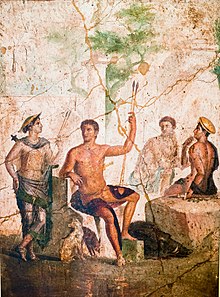Atalanta
[1][2] While living in the wild, Atalanta slew two centaurs, Rhoecus and Hylaios, with her bow after her beauty caught their attention and they attempted to rape her.
[11] In Diodorus Siculus's account, Atalanta is not only noted to have sailed with the Argonauts but to have fought alongside them at the battle in Colchis, where she, Jason, Laertes, and the sons of Thesipae were wounded and later healed by Medea.
[12] In the account of Apollonius of Rhodes, Jason prevents Atalanta from joining not because she lacks skill but because as a woman she has the potential to cause strife among men on the ship.
[14][15] Atalanta was called upon to join Meleager, Theseus, Pollux, Telamon, Peleus, and all those who were part of the Argonaut expedition on the hunt for the boar.
[14][6] Many of the men were angry that a woman was joining them, but Meleager, though having a family of his own, convinced them otherwise as he desired to father a child with Atalanta after hearing of her expertise in archery and beauty while hunting.
[14] Althaea, Meleager's mother, became grief-stricken after hearing of her brothers’ deaths and threw the log that was tied to her son's life into a fire, killing him.
[3][6] Her father agreed to the terms, and many suitors died in the attempt until Hippomenes,[5][18][note 2] who fell in love with Atalanta at first sight, appealed for divine help.
[5] Aphrodite, who felt spurned because Atalanta was a devotee of Artemis and rejected love, gave Hippomenes three irresistible golden apples.
[3][20][21] After the footrace, Hippomenes forgot to thank Aphrodite for her aid, and while the couple were out hunting the goddess afflicted them with sexual passion so that they had sex in a sanctuary belonging to either Zeus[6] or Rhea.
[24][25] She is also the focus of the 2017 historical novel For the Winner, by the British Classicist and author Emily Hauser, which retells the story of Atalanta's voyage with the Argonauts.




